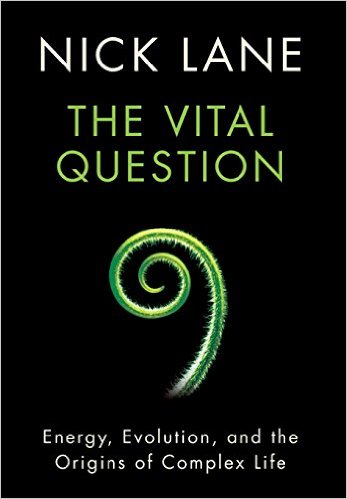Ye Olde Natural Philosophy Discussion Group
Reviews and comments on
Nick Lane: The Vital Question: Energy, Evolution,
and the Origins of Complex Life [2015]

Our group felt this book presented a very interesting theory and had a lot of of information in it, but that it is rather dense and a fairly hard read for those without a good background in biology and chemistry. On a scale of 0 to 10 our ratings were mostly in the 5 to 7 range, though one person gave it a 10. Our group average was 6.78.
Ron drew a distinction between the scientific theory presented in the book, which he considered to be a very interesting explanation for the origin of eukaryotic cells and complex life in general, and the way that theory and the mass of supporting information was presented. He felt that you might need to have a degree in chemistry to really understand everything. The book is packed with a lot of detailed information. But Ron liked the book and recommends it, though he thinks the author should have explained things better for most readers.
Kirby said that the book started off very solid, but that there was too much of “this is unknown” and perhaps implicit guess work or speculation in it. He thought the writing was obtuse and very hard to follow at times. However, he views the book as presenting a very interesting theory. He called it a good book, and one which he was glad to have read. But he was not really convinced by the whole theory.
Rich agreed with some of the earlier remarks and said that the book was too hard getting through. Rosy missed the meeting but in an email said that Lane’s thesis “seems reasonable to me, but his writing was too dense for my taste.”
Scott liked the book tremendously. He admitted that, with his fairly weak background in biology and biochemistry, some of it was hard going. For this reason he wavered on whether to give it a rating of 9 or 10. But in the end he decided it deserved a 10 because of the importance of the book and the highly plausible theory it was presenting. Scott had read about some aspects of the theory before, in science magazines, such as the suggested origin of eukaryotic cells in deep-sea alkaline hydrothermal vents. That previously had seemed to him to be rather wildly speculative. But he thought that Lane presented a convincing case as to why this was actually true. Lane explains that his whole book is actually sort of one long argument for an overall theory for the origin of complex life on earth, and Scott found that overall argument not only fascinating but quite persuasive.
John liked the book a lot too, and liked the whole theory presented in it. He agreed with others though that it was a somewhat difficult read. He said that while reading one chapter or section of the book things seemed pretty clear but that it was sometimes hard to keep all that earlier information in mind while reading a later section. He added that it felt sort of like he was taking a science course.
Vicki said the book is definitely dense with science, but not really “wordy” as some books can be. She liked the precise descriptions and thought the theory being presented was laid out well. She said she got a little lost in the details about mitochondrial DNA versus nuclear DNA, and a few other places. But though there were some such unsatisfactory parts of book, overally she really liked it.
Barbara liked the book and especially liked the connection the author brought out about the source of life in the rocks and other materials and energy in the earth. Kevin didn’t think the book should be considered successful for most people who might try to read it, because of the difficulties in understanding all the complex details. But he thinks the basic theory presented in the book is sound. It was a struggle to read though, because of the density of information in it. Kevin also pointed out that though the subtitle of the book is about the origin of complex life there are many aspects of this which are not really discussed in the book, at least very thoroughly. One such thing is the issue of how eukaryotic cells, even once they did finally come into existence, manage to adhere together into more complex organisms.
So, overall, our group considered this a challenging book to read, but most of us were still glad that we had done so and gained a lot of information from it. We also appreciated some of the greater implications of the theory in the book, such as the fact that there were apparently such difficulties getting from prokaryotic cells to eukaryotic cells and complex life, that there were a couple billion years in the evolution of life on earth when not much seemed to be changing! This very difficult hurdle does help explain why intelligent life in the galaxy appears to be so rare, as Lane notes.
Return to our complete list of books.
Return to our Science Group home page.